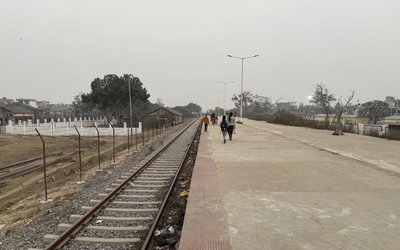
"The only thing that interferes with my learning is my education" - Albert Einstein.
The current educational system in Nepal does not enforce effective study techniques. It encourages memorization and learning that is restricted to a few texts. There is no place for creativity, outdoor learning, or even proper breaks because of how rigorous the curriculum is. Additionally, it endangers the students' health.
Due to the arduous learning process, students are frequently caught skipping class because they find it boring or feel that it is not worth their time. For the sole purpose of the tests, this pushes students to momentarily learn.
A growing number of young people from Nepal choose to study abroad for courses that are easily accessible there every year. The main reason behind this is that the current system does not meet the needs of the younger generation.
The issue arises when the school decides to have 7 hours of instruction per day divided into 6–8 periods. The large backpack that students must carry exhausts them by the time they get home, keeping them from being active for the remainder of the day.
The National Examination Board (NEB) recently modified the 10+2 curriculum. The learning environment hasn't changed for the board yet, though. It is still the same old class, surrounded by six walls, with a teacher who is always lecturing and pupils who are either paying attention, attempting to pay attention, or have given up. Yes, they study and memorize dozens of derivations, contrasts, benefits, drawbacks, dates, locations, and much more. But if a person lacks the ability to think critically, filter information, and conduct appropriately in a variety of contexts, one must seriously doubt the worth of that skill. As a result, in addition to teaching students facts, schools also need to teach them these abilities.
There have been a lot of worrying events in the realm of education over the past five years. There have been numerous instances of incorrect grading, abrupt and unexpected model changes, unstable systems, and irrational last-minute decisions or revisions, like the wording used in this year's grade 12 social assessment. These are crucial problems that haven't yet received enough attention to be handled for a nation that relies so largely on grades.
School is not just a place where children go to learn. The students spend a lot of time there, making it feel like a second home. This means that in addition to being ready to teach, schools should also be able to provide students' basic requirements, including simple access to good sanitation, medical care, wholesome food, and enough time for play. On the other hand, there have been numerous instances in Nepal where schools have been blamed for student fatalities. The situation where the school refused to let the student who tested positive for Covid-19 obtain treatment, the school hostel's disregard for the students' complaints about the geyser, and many others are examples of this.
Everyone has had difficulty readjusting to normal life after Covid-19, but teenagers in particular struggle with this. According to studies, teen mental health is today worse than it has ever been. A child finds it challenging to express their confidence as a result. Students don't speak up in class or actively participate in discussions in Nepali schools, where professors are permitted to humiliate the students in front of a crowd and school violence is still tolerated because they are afraid of seeming foolish and being wrong. They have a terrible fear of failing and making errors.
A few institutions have also been put on the do-not-attend list due to price. Learning is more influenced by your financial capacity in this situation. While those who are well off benefit from improved education, those who are struggling financially must attend regular institutions. Additionally, it has been discovered that many institutions and universities leak exam papers and purchase exam sites so that their students can cheat and receive high grades. This benefits the school, because in the end, it's all about money and reputation.
The existing system is not only encouraging an unhealthy lifestyle, but it is also contributing to a number of other issues. It has given individuals the impression that education and holding a degree are only a decoration or the barest prerequisites for social worth. Only your degree count determines how well you perform in a given subject; your actual knowledge and practical experience are ignored. The way teachers are handled makes it clear. Despite the fact that they believe in the strength of manpower, they are typically despised. All of this is due to the fact that, because the nation cannot offer a good scope for their field of study, teaching has become the "last resort" option for highly qualified individuals in fields of science and more.
As a result of the government's unwillingness to allow them to develop their own ideas, they have little choice but to look for employment abroad in order to find a position that they enjoy, or at the at least is related to their area of study. A excellent example would be the length of time it took the government of Nepal to authorize the production of motorcycles, which was only taken into consideration once it began receiving media coverage. When the corporation attempted to contact the government on its own, they ignored them for years.
People don't choose a certain subject of study because it fascinates them; rather, they do so because society accepts it, because it pays better, or because they have been coerced or brainwashed into doing so.
Students attend class out of need rather than with the intention of learning. because students need to be in class 90% of the time to take their exam. Students do not choose their 10+2 stream because it interests them or because they want to contribute. They only sign up to receive approval from others. They therefore neglect their health while they toil day and night. In spite of this, countless people push their bodies to last an additional hour simply to copy another pointless page.
There are undoubtedly schools making efforts to improve the learning environment. Few schools have chosen the International Baccalaureate (IB) program, which is an international level board of education created by the International Baccalaureate Organization (IBO), a non-profit educational organization based in Switzerland, in order to make classrooms feel more cozy and less monotonous. There are now six schools in Nepal offering IB education. Four of the six have certifications, and the other two are still applicants. Only two schools in Nepal offer the IB Diploma curriculum, nonetheless.
The curriculum is only strictly adhered to in these schools' grades 8 and 10. There, teachers have abandoned the conventional homework system in favor of more enjoyable alternatives like project work, group projects, presentations, soft copy assignments, video production, and others. Sports have been effectively included into the daily schedule at schools. Indeed, education has surpassed the confines of a library. However, this does not imply that the system has improved or changed as a result. Only a few schools are leading the way, and the majority of them continue to use the arduous old teaching approach that prevents kids from learning at their own pace.
Given the investments (in facilities and extracurricular activities that can get expensive, a solid infrastructure, and other requirements that can ultimately make the school inaccessible to many students owing to a hefty fee), it is not feasible for all schools to choose the IB curriculum. It becomes necessary for the government to alter the nation's curriculum as a result. A new system must be properly implemented, which could take several years, but it is necessary and will ultimately benefit the entire nation. By properly implementing new legislation protecting children and enhancing their learning, the weaknesses that exist today can easily be eliminated. The government will eventually need to take practical action to address these issues, and a flexible curriculum created by experts and professionals in the field might be the best place to start.
- NAGDHUNGA TUNNEL BREAKTHROUGH: Significant Milestone
- Apr 30, 2024
- Japanese Film Festival And Japan Day In Kathmandu
- Apr 09, 2024
- JENESYS Friendship Ties Program: Learning From Japan
- Feb 05, 2024
- 78th Hiroshima Day: A Look Back
- Aug 08, 2023
- JDS : Japan’s Support To Nepal
- Jul 31, 2023















